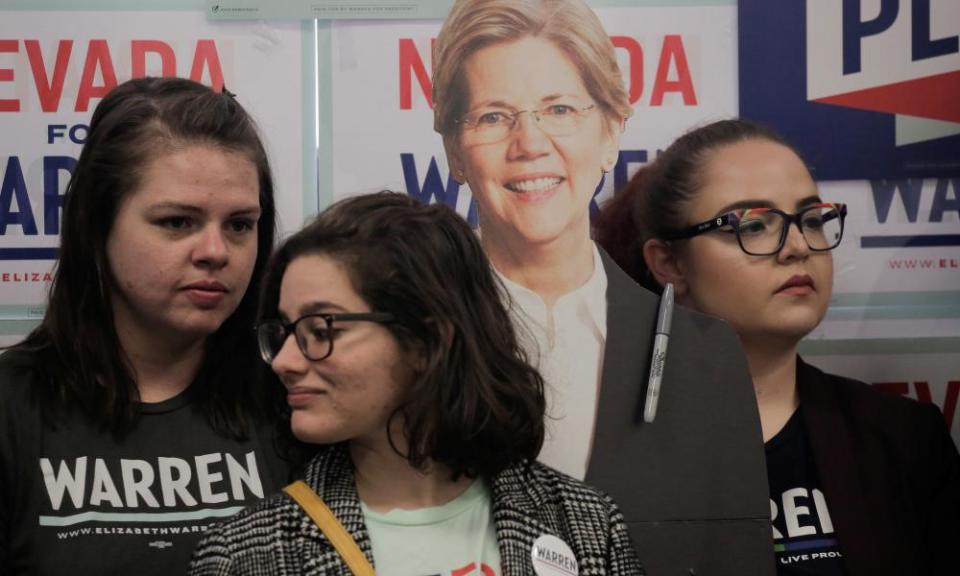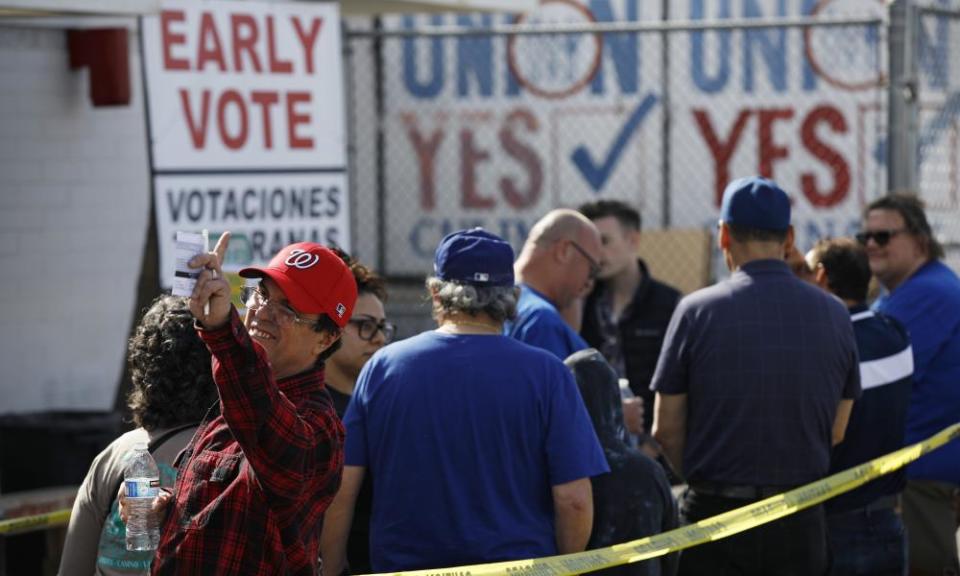Health, heat and deportations: the issues driving Nevada caucus voters

As Nevada prepares for the caucuses that could reshape the US presidential race, Democratic voters here remained divided on who is the best candidate to end the tumultuous presidency of Donald Trump.
But across the state, Democratic primary voters agreed that making Trump a one-term president is a priority – and that their daily struggles looked very different than the experiences of voters in Iowa and New Hampshire.
Related: 'She was a warrior': Warren supporters ebullient in Las Vegas after debate
“Nevada really is representative of the rest of the country,” said Deb Lomando, a 70-year-old Las Vegas resident and retired geologist. “We are going to set the narrative for the race.”
Nevada’s closely watched caucuses on Saturday will be the third vote in the primary this year, but the first in a state with a diverse population that more closely resembles the demographics of America and the Democratic party. While the first two states are 90% white, Nevada is nearly 30% Latino, 10% black and has a growing Asian American population. That makes the “first in the west” caucuses a pivotal test of the diversity of each campaign’s supporters.
Recent polls have shown the Vermont senator Bernie Sanders with a sizable lead in the state after establishing himself as a frontrunner in Iowa and New Hampshire. But the Massachusetts senator Elizabeth Warren had a particularly strong debate performance in Vegas, which has energized her campaign and could shake up the caucuses. Former vice-president Joe Biden is hoping for some kind of comeback. And Saturday will also illustrate whether the more moderate candidates from the midwest, Pete Buttigieg and Amy Klobuchar, can attract voters of color in the west.
From Las Vegas in the south to Reno in the north, voters told the Guardian this week that the race was highly personal and urgent, mentioning the suffering caused by Trump’s deportation machine, the imminent threats of the climate crisis, the fights for labor protections and better jobs for low-wage workers, the protection of public lands and more.
Lorraine Oliver, a 68-year-old public health nurse in Vegas, has lived in the US for decades but grew up in South Africa: “I’m from one of the ‘shithole countries’,” she said when asked what the race meant to her, referencing the infamous reports in 2018 of the president’s insults against a number of African nations. “It is a big affront to me. It’s an affront all of the time.”

Oliver, a Warren supporter, said the struggles of the most vulnerable patients she served are a constant reminder of the significance of this race. Whether Trump’s attacks on low-income immigrants’ access to food stamps and the rights of refugees, or his threats to deport Dreamers (immigrants brought to the US as children and protected under Obama), “It just brings you down, emotionally.”
Jocelyn Torres, a 30-year-old who works at a not-for-profit, said it was stressful to even consider the possibility of a second term of the president’s anti-immigrant agenda: “Another four years of the Trump administration could completely ruin us as a community … Some people’s lives are on hold. It’s no way to live.”
Related: Bellwether caucuses: diverse Nevada is a crucial test for Democrats
In the final stretch of the race, the candidates have been spending most of their time in Vegas, which is known globally for its casino industry and is often a focal point of state political organizing. Reno, a smaller city 400 miles north of Vegas and not far from Lake Tahoe, has been seen as a crucial region in a swing state. There was less visible campaigning this week in the colder city by snowy mountains, but small groups were coordinating last-minute canvassing trips.
On a break from work in downtown Reno, Tanya Duncan said the ongoing hardships facing her parents and her children moved her to vote for Sanders. The 47-year-old financial analyst is taking care of the medical needs of both her parents and said she constantly struggles to make sense of their insurance. “People who have more money are getting better-quality care. Money shouldn’t be able to buy health.”
Meanwhile, Duncan’s children are both students who will be graduating with huge debts. “They are not going to be able to survive when they get out of school. It’s horrible. And it’s just not fair.”
Laynette Evans, a 67-year-old career coach, who traveled from Reno to Vegas for the presidential debate on Wednesday, noted that the state’s two major cities are the fastest-warming in the US, a trend that has significant and sometimes fatal health consequences. “I probably won’t be around for the worst of it, but I have three children and I want them to have a big future. We’ve already lost so much critical time, which makes it so much harder to achieve what we must in order to prevent the worst.”
This week, the Culinary Union, Nevada’s largest and most powerful union, received international attention with a picket outside the Palms casino resort in Vegas that drew appearances from many of the Democratic candidates.
“You’re working full time, 40 hours and you don’t have enough money to pay your bills. It’s very sad,” said Victor Chicas, a 53-year-old union member, who works as a server assistant at a casino restaurant.
Chicas grew up in El Salvador and came to the US in 1990 to seek asylum and flee violence in his home country. He said he wanted to see all the Democratic candidates fight to protect immigrants like him and address the daily anxieties his community faces: “We have a politician come in and do something for immigrants, and then we have another politician come in and take it away. We are in limbo. We don’t know if the eyes of immigration officers will be outside of our doors looking for us.”
Rebeca Wolfe, a 34-year-old stay-at-home mother in Reno, who was knocking on doors for Warren on Thursday, said affordable childcare was her number one issue. She was on a seven-month waiting list to get her daughter, now 21 months old, a spot at a daycare. Warren’s passion on the issue gave her a feeling of optimism, she said. But if Trump wins, “There’s a lot of fear that might be amplified and turned into hopelessness.”

Latinos across Reno are united in their anxieties, she added: “Every single Latino knows someone who came here undocumented or is currently undocumented. So it’s very personal.”
Tom Flynn, a 70-year-old retired surgeon also knocking on doors on Thursday in Reno, said his experience with the healthcare industry was one of his motivations for helping with voter outreach. He mentioned people in his life suffering long-term health consequences due to their inability to afford care – one friend with a lump on his neck that has continued to grow, which he can’t afford to remove; another hit by a drunk driver who was uninsured, who now can’t afford to get back surgery to fix his chronic pain and is no longer employable.
The diversity of Nevada’s voters extends beyond the major cities. At the Pyramid Lake Paiute tribe, Janet Davis, 59, said she has been organizing to make sure tribal members have easy access to voting. She noted that Trump’s attacks on environmental regulations threatened the protection of her tribe’s water, and that federal budget cuts had hurt local health clinics and other programs.
Davis, who was still deciding between Warren and Sanders, said she hoped to see a surge in turnout from Native American voters: “Our numbers can make a difference.” Beyond the policies that target communities like hers, she said she was also eager to see Trump gone because of the way he has eroded the basic rules and standards of his office: “It’s like it’s not really a democracy.”


